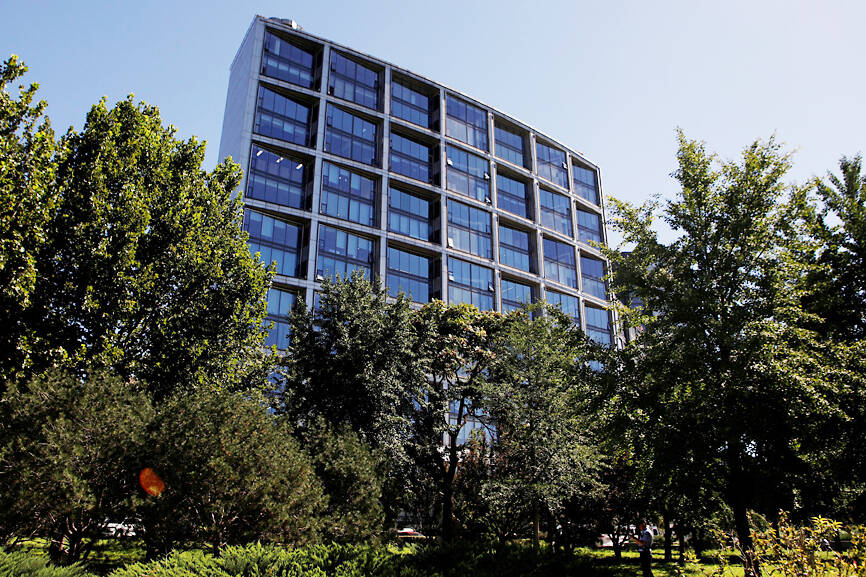Chinese authorities said they recently opened criminal investigations into Zhongzhi Enterprise Group Co’s (中植企業) money management business, days after the embattled shadow banking giant revealed a shortfall of US$36.4 billion in its balance sheet.
Police in Beijing said in a statement on WeChat that they took “criminal mandatory measures” against multiple suspects, identifying one by their last name, Xie (解). They urged investors to report cases or provide leads to the authorities, including filing complaints online. Xie Zhikun (解直錕), the group’s founder, died in 2021, but several of his relatives are executives at the company.
The statement did not elaborate on what the measures entail or what crimes they might have committed.

Photo: Reuters
The legal terminology used to describe the situation was similar to that used in the case of Evergrande Group’s (恆大集團) billionaire chairman Hui Ka Yan (許家印). Evergrande said in September that Hui was suspected of committing crimes.
The mandatory or coercive measures could take several forms, including summons, release on bail and residential surveillance, and detention and arrest, according to Chinese procedural law. The measures can be enforced by the police, courts or prosecutors.
Prior to Evergrande’s Hui, similar measures were taken against some staff of the money management business of the developer at the center of China’s property crisis, a police statement in September showed.
Privately owned Zhongzhi earlier last week revealed the depth of its financial difficulties, telling investors it is “severely insolvent” with a shortfall of US$36.4 billion.
The wealth manager said liquidity has dried up and the recoverable amount from asset disposals is expected to be low, a letter sent to investors on Wednesday showed.
Zhongzhi first triggered concern in August after one of its trust-company affiliates failed to make payments to customers on high-yield investment products. The group’s financial difficulties add to Chinese President Xi Jinping’s (習近平) challenges as officials grapple with a property crisis and a weak economy.
The firm said the death of its founder, Xie, and the subsequent departure of senior executives had led to a failure of internal management. Previous efforts at a “self-rescue” did not meet expectations, Wednesday’s letter showed.
Those affected by Zhongzhi’s troubles are likely to be wealthy individuals. Shadow banks such as Zhongzhi are loosely regulated firms that pool household savings to offer loans to invest in real estate, stocks, bonds and commodities. In recent years, even as rival trusts pared risks, Zhongzhi and its affiliates, especially Zhongrong International Trust Co (中融國際信託), extended financing to troubled developers and snapped up assets from companies, including Evergrande.
Authorities on Saturday called on Zhongzhi’s investors to “actively cooperate with the police investigations and protect own[er’s] rights and interests through legal channels” to help retrieve criminal proceeds and recover their losses.

In Italy’s storied gold-making hubs, jewelers are reworking their designs to trim gold content as they race to blunt the effect of record prices and appeal to shoppers watching their budgets. Gold prices hit a record high on Thursday, surging near US$5,600 an ounce, more than double a year ago as geopolitical concerns and jitters over trade pushed investors toward the safe-haven asset. The rally is putting undue pressure on small artisans as they face mounting demands from customers, including international brands, to produce cheaper items, from signature pieces to wedding rings, according to interviews with four independent jewelers in Italy’s main

Macronix International Co (旺宏), the world’s biggest NOR flash memory supplier, yesterday said it would spend NT$22 billion (US$699.1 million) on capacity expansion this year to increase its production of mid-to-low-density memory chips as the world’s major memorychip suppliers are phasing out the market. The company said its planned capital expenditures are about 11 times higher than the NT$1.8 billion it spent on new facilities and equipment last year. A majority of this year’s outlay would be allocated to step up capacity of multi-level cell (MLC) NAND flash memory chips, which are used in embedded multimedia cards (eMMC), a managed

CULPRITS: Factors that affected the slip included falling global crude oil prices, wait-and-see consumer attitudes due to US tariffs and a different Lunar New Year holiday schedule Taiwan’s retail sales ended a nine-year growth streak last year, slipping 0.2 percent from a year earlier as uncertainty over US tariff policies affected demand for durable goods, data released on Friday by the Ministry of Economic Affairs showed. Last year’s retail sales totaled NT$4.84 trillion (US$153.27 billion), down about NT$9.5 billion, or 0.2 percent, from 2024. Despite the decline, the figure was still the second-highest annual sales total on record. Ministry statistics department deputy head Chen Yu-fang (陳玉芳) said sales of cars, motorcycles and related products, which accounted for 17.4 percent of total retail rales last year, fell NT$68.1 billion, or

In the wake of strong global demand for AI applications, Taiwan’s export-oriented economy accelerated with the composite index of economic indicators flashing the first “red” light in December for one year, indicating the economy is in booming mode, the National Development Council (NDC) said yesterday. Moreover, the index of leading indicators, which gauges the potential state of the economy over the next six months, also moved higher in December amid growing optimism over the outlook, the NDC said. In December, the index of economic indicators rose one point from a month earlier to 38, at the lower end of the “red” light.